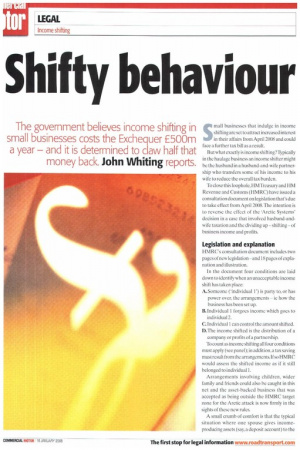Shifty behaviour
Page 26

Page 27

If you've noticed an error in this article please click here to report it so we can fix it.
The government believes income shifting in small businesses costs the Exchequer E500m a year — and it is determined to claw half that money back. John Whiting reports.
Small businesses that indulge in income shifting are set to attract increased interest in their affairs from April 2008 and could face a further tax bill as a result.
But what exactly is income shifting? Typically in the haulage business an income shifter might be the husband in a husband-and-wife partnership who transfers some of his income to his wife to reduce the overall tax burden.
To close this loophole, HMTreasury and HM Revenue and Customs (HMRC) have issued a consultation document on legislation that's due to take effect from April 2008. The intention is to reverse the effect of the 'Arctic Systems' decision in a case that involved husband-andwife taxation and the dividing up — shifting — of business income and profits.
Legislation and explanation HMRC's consultation document includes two pages of new legislation—and 18 pages of explanation and illustration.
In the document four conditions are laid down to identify when an unacceptable income shift has taken place: A. Someone (individual 1') is party to, or has power over, the arrangements — ie how the business has been set up.
B. Individual 1 forgoes income which goes to individual 2.
C. I ndividual 1 can control the amount shifted.
D. The income shifted is the distribution of a company or profits of a partnership.
To count as income shifting all four conditions must apply (see panel); in addition, a tax saving must result from the arrangements. If so HMRC would assess the shifted income as if it still belonged to individual 1.
Arrangements involving children, wider family and friends could also be caught in this net and the asset-backed business that was accepted as being outside the HMRC target zone for the Arctic attack is now firmly in the sights of these new rules.
A small crumb of comfort is that the typical situation where one spouse gives incomeproducing assets (say, a deposit account) to the other so that the latter can receive the income won't be caught it will fail condition D.
HMRC's consultation document suggests it has "identified 65,000 companies where income shifting is likely to be taking place" and talks in terms of tax losses of i500m a year,half of which will be elawedback by the new rules. It goes on to say: The government is looking to individuals to comply voluntarily without the need for [HMRC.] interventions".
Managing the situation
HMRC is going to expect to see that the participants in a business receive a fair reward for their own efforts. So if two people are involved in the business and one contributes four times as much 'value' as the other, that suggests a 4:1 ratio of salary. Salaries should also be near market rates. It does not mean that all profits have to be paid out as salary-profits can be left over and shared equally.
There are other factors to take into account and assess in terms of value to the business. These factors will include capital introduced, perhaps including loan guarantees and other connections that have helped the business.
Businesses will need to keep an eye on situations where the amount of effort put in by one party changes: in an HMRC example, one partner stops working for a spell meaning that the profit sharing should alter to prevent income shifting.
Hopefully. HMRC will make allowances for circumstances such as illness and pregnancy in the final draft of the legislation.
Although the consultation document says HMRC would not expect any further documentation to be needed to prove a situation is outside the definition of income shifting, it seems inevitable that businesses will have to get better at documenting how they have valued individuals' contributions.
• John Whiting is a past president of The Chartered Institute of Taxation (ClOT) and Chairman of the CIOT's Management of Taxes Sub-Committee.
Contacts
www.hm-treasury.gov.uk I www.hrnrc. goy. uk


































































































































































